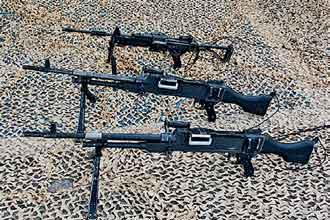19 Nov 2024 - {{hitsCtrl.values.hits}}

Deadly automated weaponry
 Autonomous weapon systems are weapons that detect and apply force to a target based on sensor inputs, rather than direct human inputs. After the human user activates the weapons system, there is a period of time where the weapons system can apply force to a target without direct human approval.
Autonomous weapon systems are weapons that detect and apply force to a target based on sensor inputs, rather than direct human inputs. After the human user activates the weapons system, there is a period of time where the weapons system can apply force to a target without direct human approval.
The First Committee of the United Nations General Assembly, on the 5 th of November 2024, adopted Resolution L-77 on Autonomous Weapons. A total of 161 States voted in favour of the resolution, with 3 States voting against, and 13 abstentions. Sri Lanka was one of 26 States co-sponsoring the resolution that was tabled by Austria and played a key role in taking the resolution forward.
A total of 161 States voted in favour of the resolution, with 3 States voting against, and 13 abstentions. Sri Lanka was one of 26 States co-sponsoring the resolution that was tabled by Austria
 The resolution voices concern about the “possible negative consequences and impact of autonomous weapons systems on global security and regional and international stability”, stresses the importance of the role of humans in the use of force to ensure responsibility and accountability and notes the repeated calls by the Secretary- General to urgently conclude negotiations of a legally binding instrument with prohibitions and regulations for autonomous weapons systems. Significantly, the resolution convenes open informal consultations in New York for a duration of two days in 2025 complementarity with the mandate of the Group of Governmental Experts of the Convention on Certain Conventional Weapons (CCW). The significance of these informal consultations lies in its inclusivity – the inclusion of ALL States in considering matters relating to autonomous weapons systems is key, especially given that the consequences of autonomous weapons are by no means limited to select States. The informal consultations also ensure that, in addition to aspects of humanitarian law that are the primary focus of the CCW, other questions that cannot be neglected in examining the necessity for a legally binding instrument on Autonomous Weapons are international human rights law and ethics, which will also be considered and engaged with by States.
The resolution voices concern about the “possible negative consequences and impact of autonomous weapons systems on global security and regional and international stability”, stresses the importance of the role of humans in the use of force to ensure responsibility and accountability and notes the repeated calls by the Secretary- General to urgently conclude negotiations of a legally binding instrument with prohibitions and regulations for autonomous weapons systems. Significantly, the resolution convenes open informal consultations in New York for a duration of two days in 2025 complementarity with the mandate of the Group of Governmental Experts of the Convention on Certain Conventional Weapons (CCW). The significance of these informal consultations lies in its inclusivity – the inclusion of ALL States in considering matters relating to autonomous weapons systems is key, especially given that the consequences of autonomous weapons are by no means limited to select States. The informal consultations also ensure that, in addition to aspects of humanitarian law that are the primary focus of the CCW, other questions that cannot be neglected in examining the necessity for a legally binding instrument on Autonomous Weapons are international human rights law and ethics, which will also be considered and engaged with by States.
Repeated calls by the Secretary- General to urgently conclude negotiations of a legally binding instrument with prohibitions and regulations for autonomous weapons systems
Without meaningful human control the use of these weapons both in armed conflict and instances outside of armed conflict such as border control, pose serious threats in relation to the principles of humanitarian law as well as human rights law and raise serious moral and ethical concerns. As the integration of automation in weaponry increases and the use of artificial intelligence in the military domain grows in popularity, the need for the prohibition and regulation of autonomous weapons only grows in urgency.
21 Dec 2024 21 Dec 2024
21 Dec 2024 21 Dec 2024
21 Dec 2024 21 Dec 2024
21 Dec 2024 21 Dec 2024
21 Dec 2024 21 Dec 2024